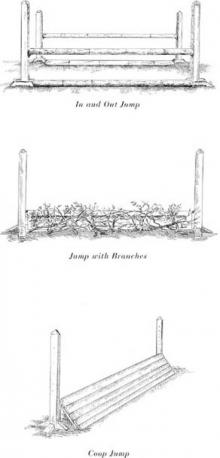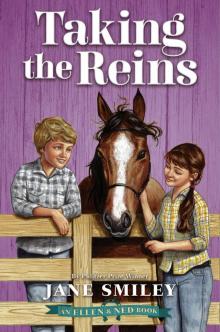- Home
- Jane Smiley
The Greenlanders Page 48
The Greenlanders Read online
Page 48
Ofeig Thorkelsson was not the only one of these men to be on bad terms with his father. Mar and Einar, who were brothers, had neither spoken to nor heard news of their father, who lived in the southern part of the district, since the summer, and they feared that he with much of his household had died in the hunger, for the steading was not a prosperous one. Even so, Jon Andres told them, they must find another place to live, for his intention was fixed, and he intended to be free of them by the evening, or at the latest, the next morning. Andres Bjartsson and Halldor Bessason now got up and began to gather their belongings together, and it seemed to Jon Andres that Halldor was actually relieved and pleased to go, while Andres was resigned, as he had had news of his father at Yule, and all had been well at his father’s steading at that time.
Mar and Einar began to grumble. Jon Andres said, “After these years of friendship, it would not please me to throw you out, or for us to part with ill feelings. But it is the case that times are different now than they have been, and such bands as ours do not repay in good fellowship what they cost in wasted provisions and trouble with neighbors, for I will not hide from you the fact that folk in this district are angry at me for the mischief we all have done, and they speak against me, and declare that I have incited you. Arnkel Thorbergsson is especially angry at the seduction of his daughter and threatens action against me if he and she do not chance to starve before the Thing. But I knew nothing of this seduction until he told me of it.” And Jon Andres glared at Einar Marsson, for he was to blame in this.
Ofeig settled back against the wall, and Jon Andres turned to him. “Do not think, Ofeig, that I exclude you from these arrangements. Although we have been companions since boyhood, your pranks no longer amuse me. I think it would be well for you to reform your character, and apply to your father for forgiveness, for after tonight you will get nothing more at Ketils Stead.” He paused, then went on. “When I heard the priest pray over you not so long ago, my eyes were opened, though yours were not. It has seemed to me for these last days that I look damnation in the face and am too ignorant to recognize it, but if I did I would be a hundred times more terrified than I am now, and right now I am terrified enough.” Jon Andres saw that Halldor was nodding a bit in his corner, as if he had had similar thoughts, and he went on, “Folk in the district will say that it was I who led you out of the proper ways, and indeed, I am willing to take this blame, if such a thing will recommend you to your fathers. When I look back, I see that I was full of seething resentments and longings that I couldn’t speak of, they were so mixed together. But I see that you do not attend to anything I say, and so I will not go on, except to say that I expect you to attend to this, the necessity of being away from Ketils Stead by the morning light.”
And for the rest of the day and evening, Jon Andres sat up and looked alertly about himself, for it seemed to him that Ofeig, and maybe Mar and Einar, would come at him and try to kill him, but they did not. They left quietly with Halldor and Andres, going on skis and leading their horses in a line behind them. After they left, Jon Andres slept, only with three servants standing guard over the steading, and when he woke up, he loitered about the steading rather aimlessly, wishing for companionship, for he had not been without some of these boys since he was twelve winters old.
After leaving Ketils Stead, Halldor and Andres parted from the other two, and took their horses and goods to the south, and what they found there was no better, but no worse, than what was to be found at any other steading in the district, namely that some folk had died and some had not, and there was little food to be had. Einar and Mar decided to go to the steading of their uncle, the brother of their mother, a man named Ari, and they parted from Ofeig and made their way to Yfirfoss Stead, where Ari lived, but they only stayed there two days, for Ari had nothing to give them. Ofeig made it his plan to linger about Undir Hofdi church, and to squat in the priest’s house there, for he knew that Sira Audun would not be back for some weeks. It seemed to him that if Thorkel Gellison were to find him, he would kill him rather than take him in again.
Einar and Mar returned from Yfirfoss, and went to the steading of another uncle, this one the husband of their mother’s sister, a man named Bengt, and they left this steading after four days. Then they went to the steading of a cousin, a man named Ingvald. Here they stayed for two days before leaving. At each of these steadings, the one thing they spoke of was how much food Vigdis of Gunnars Stead had stored everywhere on her farm, and it did not take long for this news to penetrate every steading in the district, and for men to begin to talk about what a crime it was for this old woman to have so much food all to herself. Sometime in their travels, Mar and Einar began to discuss a notion they had, of taking some of Vigdis’ food and using it as a gift to win themselves a permanent place on some steading. In every case when they brought this up, as something that ought to be done, or could easily be done, one man or other on every steading looked at them with quickened interest.
Not long after leaving Ingvald’s little steading, they ran into Ofeig, who told about staying at the priest’s house at the church, and they came there and joined him. Ofeig had no food left, and Mar and Einar had just enough for a mouthful for everyone, and that night they began chatting again, as always, about Vigdis, and the next morning, all three of the men left the church house and went in different directions, and two days later, all three were back, and about twelve other men besides, and these men lingered about the church house all day, and then, in the evening, they departed in a band and directed themselves toward Gunnars Stead.
It was a saying among the Greenlanders, that “not every gobbet in the stew is mutton,” and this was the case, also, with Ofeig’s band of men. Some men will join any undertaking simply to see what might happen, others have vaguer motives even than this. They follow any movement, perhaps, simply because movement is of interest in the dead of winter. A few men, such as Bengt, the uncle of the Marssons, had heard of Vigdis’ quantities of provisions and ached to see them, merely to see the truth of the tale. Mar and Einar thought of stealing a portion. Others, perhaps, thought of this, too, for more than a few of these folk were men with families and servants. One or two of these men bore recent grudges against Vigdis, or older enmity from the days of Erlend and his sons.
However their feelings stood when they left the priest’s house, it is the truth that the quick walk through the snow in the frigid dark developed their appetites wonderfully, such appetites as men have who haven’t been satisfied in two winters, or in the summer between them. They came to the steading as men come to a feast, or bears to their first kill of the spring. The farm buildings lay before them in the moonlight, as neatly turfed as in the days of Asgeir Gunnarsson or his father, for Vigdis liked things to be in good repair. The storehouse lay near the steading, and the cowbyre behind, with the sheep pens open to the south. Another cluster of buildings, which included a smithy and a bath house, lay off the path from the church, some ways in front of the steading, and here the band of men stopped and listened for the barking of the dogs. None came, for the dogs were in the chambers off the cowbyre with the cowmen, and the wind blew from them into the faces of the intruders. All was silent. Einar and Mar went to the storehouse and forced open the door.
The mixed odor of meat and whey rolled forth through the door like a blast of heat, inflaming Einar so that he stumbled into the storehouse and began reaching in the dark with his hands and grabbing anything he touched. There were sausages and joints of dried or smoked meat, rounds and loops of cheese hanging from thongs, lumps of butter stacked against the wall. Einar groaned so at the wealth of provisions that Mar and another man pushed him out of the way in the dark, and then stepped on him in their impatience to get inside. The doorway was low and narrow, as with all storehouses, and the men crowded around it, inhaling the rich odors.
It is the case that when folk come long distances for a feast, the wife and her servingwomen must feed them all as quickly as is seemly, for the longer the
y wait, the more quarrelsome they become, and the more they stare at the bowls and trenchers passed to their neighbors and the more they feel slighted at the size of their own portions. Now it happened that Einar’s fall blocked the doorway of the storehouse, and in the darkness, men could not see how to lift him out of the way, or how to get around him, but they could hear Mar and the other man pulling things off the hooks and shelves, and indeed, they could hear the working of jaws and low grunts of pleasure, for it is with a man as with a dog—hungry ears are sharp ones. The men in the doorway began to shout at one another, and shove each other aside, and fear that other men were getting more to eat and to carry away than they themselves were. Now Ofeig said, “Nay, enough of this. There is more to be had in the steading.” And he ran through the snow to the door of the steading, and with one heavy blow of his shoulder, he knocked it down.
At this, a dog began to bark, and soon some others, and men began to run from the storehouse to the steading. Inside the steading, Vigdis sat up in her bedcloset and held forth her seal oil lamp, and was heard to say, “Now I see that Satan and his minions have come upon me at last.” Two elderly servingmen came in from another chamber in the steading with raised staves, and a blow from one of these glanced off Ofeig’s shoulder, angering him so that he turned and brought his great fist down on the fellow’s neck. The man collapsed on the floor. Perhaps the band of men had intended to do no injury, only to take some food and leave, but after this blow, the doing of injury seemed a simple and natural thing, a thing that could not be avoided in the course of events. Other servants came running from the cowbyre, all old men, and they, too, carried staves, and shouted about the devil’s work, and the dogs came with them, barking and howling at the top of their lungs, so that there was great confusion.
One man, named Thorvald, a friend of Bengt, who had once sat in Vigdis’ place at the church, and thereafter was subjected to a humiliating scolding, pulled the woman from her bedcloset, so that she fell upon the floor, screaming and cursing. She slept naked, wrapped in furs for warmth, and the sight of her bare flesh was startling to Thorvald and Bengt and everyone present, for it glowed with fat. More than one man was inflamed by the contrast of this flesh with that of the wife he had just been with or the bones of the child he had recently buried, so that it was easy to land a kick upon the old woman, or slap her across her fat cheeks, or pinch her pendulous breasts until red circles stood out on the skin like burns. “Lord!” shouted Vigdis. “They bite me, they bite me to the bone. Their evil devours me!” And she screeched in pain even when no one was touching her. To stop the screeching, Ofeig kicked her hard in the jaw, and after this, she could not form words, but the screaming did not cease, and the men were stirred by it to actions they had not thought of before, and the joints of beef and reindeer meat that hung about the walls became weapons in their hands. Mar Marsson tipped over a small dish of honey, and the liquid seeped into the table, and he took the soapstone dish and brought it down on the head of one of Vigdis’ servingmen, so that his skull was cracked and blood and brains spilled forth.
Ofeig and another man pulled Vigdis out from under the table, where she had rolled, and kicked and beat her with their fists until she fell silent. Now the other man stepped back, but Ofeig, seeing Vigdis’ crescent-shaped knife upon the table, snatched it up, saying, “Let us gut this old bear and see what Christian children she has been feasting on,” and he slit her from throat to belly, and opened the stomach, as a hunter would a reindeer, and those present saw that his eyes glowed with pleasure, and were not dull and dead as usual. It was not known, in the melee, just when Vigdis gave up her last breath, whether during the beating or not until she was disemboweled, for the wind makes noises leaving the corpus that are the noises of death, not life.
Now that Vigdis and two of her servants were dead and the other servants subdued, Ofeig’s band fell to a great eating frenzy that lasted until daylight, and then, after retching, they fell about the steading and went to sleep. What greeted them when they woke up in the afternoon light was such a scene as they did not recognize or remember, and the events of the night before came back to them partially, if at all, as the fragments of dreams, or tales of other times. When Einar Marsson went out in the yard to retch again, he found Jon Andres Erlendsson and a band of some thirty men standing in a circle about the steading, and they were fully armed. Now Ofeig came out and saw the same thing, and he said, “Better we had killed all the servants, and that’s a fact.”
Ofeig turned and got inside the steading again, but Einar was dizzy from retching, and only stood looking at the band of avengers, until Jon Andres raised his hand, and another man, named Axel Josteinsson, who had a crossbow, let his arrow fly, and it lodged itself in Einar’s breast, and he fell to the snow, gasping. The men inside the steading were without weapons, while Jon Andres’ men had an assortment of weapons such as the Greenlanders could muster at this time, mainly axes and clubs and bows and arrows, including three old crossbows from the time of King Sverri, but no noble weapons such as men carried in former times, namely swords. Jon Andres shouted to the men inside the steading that they must send Ofeig forth to receive his punishment, but the only sign that these words were heard was this, that the door opened and the corpus of Vigdis’ servant, Karl, was thrown out into the snow.
The inside of the steading was a great mess of blood and grease and vomit, and some of the men there thought that they would surely die of the stench, and they saw by the light of clear day that it was the stench of Hell placed before them. Some fell to praying and others to whimpering, and Ofeig did not mind these activities, but if any went near the door, Ofeig grabbed his arms and broke them or cast him back into the rear of the steading like so much whale meat, for Ofeig seemed to draw strength from the scene of his debauch, and new life, as well. He looked about himself with a pleased glow in his face. Once he picked up the corpus of Vigdis and rolled it into the bedcloset, and thereafter he threatened those who displeased him with being “locked in the old she-bear’s embrace.” And so it went on for some time, with only this change, that men’s bowels tormented them increasingly, from the effects of the rich meats they had eaten in the night, and so they were forced to relieve themselves on the floor of the steading, since they were barred from leaving to find the privy, or even from going to other chambers in the steading. Ofeig knew that there were other ways out of the steading, more ways than he could stand guard over. Only Ofeig himself was free of these pains, and as he continued to eat, he laughed aloud at the groaning of the others.
Outside, the day drew on and Jon Andres began to feel impatient, and he and some of his friends spoke of burning Ofeig out of the steading, but the turf was fresh from the previous summer, and largely covered with snow. The steading itself was built more of stone than of wood, and the stones were set as tightly as any in Greenland, offering no entrance for a flaming arrow. A man could run to the door and pitch a torch dipped in seal oil into the steading, but Ofeig would see that and put it out before any damage was done. And so it seemed that the only course was to wait Ofeig out, but such a course angered Jon Andres so that he had great difficulty containing himself, and paced furiously back and forth before his men. His one consolation was that the light of the moon on the snow would prevent escape from any entrance to the steading, if his men were alert enough. Night drew on. Ten men went to sleep in the byre, where the cows, the last cows in Vatna Hverfi district, lowed in the peaceful darkness.
Inside the steading, night drew on as well, and men struggled against sleep so that they might watch Ofeig and escape when sleep overtook him, for indeed, Ofeig had found some ancient mead locked away in a deep cupboard and was partaking of it. Though he took it in great drafts, its only effect was to raise his spirits higher, so that he began looking about the room and shouting jests to the others, and once he lifted up a sturdy bench that was sitting against the wall and broke it over his leg. Such a devil seemed to be in him as was stronger than five men, or even ten.
>
And this is what some priests say that Satan is, a great mouth that sucks down all matter of beasts and men and carries them inside himself to the depths of Hell, where he shits them out, and it was the great sin of the Greenlanders that in the face of God’s test of their faith, some of them made a lord of such a devil as Ofeig and were led by him into this Hellish steading, and Ofeig, like his master, stood by unsleeping to guard the door, and to prevent the escape of any of his hirdmen. Also like souls in Hell, these Greenlanders groaned at the agony of their guts, and dirtied themselves and repelled their fellows, so that no two of them could make a pact together and overthrow their master. They were sunk in fear.
Outside, the night grew lighter, and those who had been sleeping in the serene warmth of the byre roused themselves and came forth into the dawn. Jon Andres invited them to partake of the stores in the storehouse, and they did so with moderation, for great appetite is a ruse and a snare that betrays men into agony. After the men were fortified, they walked about the yard of the steading. They could hear the muffled shouts of those inside, as men can sometimes hear the muffled screams of demons imprisoned in stones. Jon Andres said, “Before long now they will come forth to their punishment,” and he smiled a grim and angry smile, for indeed, his anger had not diminished since the day before. The sun rose over the snowy meadows and frozen lakes of Vatna Hverfi district.
Now toward noon the door to the steading opened and men began coming forth, staggering and shamefaced. Some fell in the snow and rolled about, while others only lay there as if swooning. Ofeig was not among them, and after all had come out, Jon Andres and three of his men ran into the steading, but indeed, Ofeig was nowhere to be found, in none of the many chambers, and the snow had been so beaten down by the tramping of Jon Andres’ men that no tracks revealed the direction of his escape, if indeed, muttered some of the men, that direction had not been straight down, for it is well known that Satan cannot wait for some men, those whom he especially prizes, but he snatches them away in the midst of life.

 The Georges and the Jewels
The Georges and the Jewels Pie in the Sky: Book Four of the Horses of Oak Valley Ranch
Pie in the Sky: Book Four of the Horses of Oak Valley Ranch Duplicate Keys
Duplicate Keys Charles Dickens
Charles Dickens Good Faith
Good Faith Private Life
Private Life A Thousand Acres: A Novel
A Thousand Acres: A Novel The Greenlanders
The Greenlanders Ten Days in the Hills
Ten Days in the Hills Gee Whiz: Book Five of the Horses of Oak Valley Ranch
Gee Whiz: Book Five of the Horses of Oak Valley Ranch A Thousand Acres
A Thousand Acres The All-True Travels and Adventures of Lidie Newton
The All-True Travels and Adventures of Lidie Newton Ordinary Love and Good Will
Ordinary Love and Good Will Taking the Reins (An Ellen & Ned Book)
Taking the Reins (An Ellen & Ned Book) The Man Who Invented the Computer
The Man Who Invented the Computer Horse Heaven
Horse Heaven The Age of Grief
The Age of Grief Riding Lessons
Riding Lessons Perestroika in Paris
Perestroika in Paris A Good Horse: Book Two of the Horses of Oak Valley Ranch
A Good Horse: Book Two of the Horses of Oak Valley Ranch Saddles & Secrets (An Ellen & Ned Book)
Saddles & Secrets (An Ellen & Ned Book) Some Luck: A Novel
Some Luck: A Novel Champion Horse
Champion Horse Some Luck
Some Luck Gee Whiz
Gee Whiz Barn Blind
Barn Blind A Thousand Acres (1992 Pulitzer Prize)
A Thousand Acres (1992 Pulitzer Prize) Pie in the Sky
Pie in the Sky True Blue
True Blue A Thousand Acres_A Novel
A Thousand Acres_A Novel A Good Horse
A Good Horse